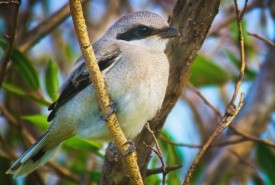Loggerhead shrike: A prairie jewel

Loggerhead shrike (Photo by Don and Karol Dabbs)
A denizen of the native prairie landscape, the loggerhead shrike has captivated me for years with its beauty, behaviour and pizzazz. Even its Latin name, Lanius ludovicianus, rolls off the tongue with passion and grace. Of course, the romanticism it invokes is somewhat diminished by the meaning behind the name: "butcher of Louisiana."
The loggerhead shrike was first described from specimens taken on its wintering grounds in the Louisiana Territory. Despite being a songbird, early naturalists noted its strong, hooked bill and predatory habits that were more like those of a raptor, though without strong talons with which to grip its prey. To overcome this obstacle, shrikes have evolved their characteristic behaviour of hooking or impaling prey — insects, small birds, and rodents — on a thorn or spike to secure it for feeding. From this comes the colloquial name of "butcher bird" that is often given to this species and its close cousin, the northern shrike, which breeds in northern Canada and Alaska and winters across the forests and plains of southern Canada and the northern United States.
The prairie population of loggerhead shrike has been in decline since at least the 1970s due to loss of suitable habitat across its range and other factors. Even 10 years ago, a drive in the country between late April and September would be unfulfilled without an occasional glimpse of this unique hunter sitting on a wire or the tip-top of a caragana or buffaloberry perch. Since then, the population has declined by nearly 50 percent and now I sometimes need to drive for hours on the grids of my beloved southwestern Saskatchewan before seeing even one of these wonderful birds.
Whether it is acting as a silent sentinel, or rattling off its repetitious, scolding call, the loggerhead shrike is an interesting bird. And even though it lacks the bright plumages and intricate songs of other birds which people are familiar, the muted blue-grey colouration contrasting with white and black patterning is no less striking in my opinion.
In closing, I will leave you with a poem composed by Saskatchewan poet Jerry Rush entitled "Butcher Bird," as a tribute to this treasure of nature:
Saskatchewan barbed wire
stretches thrumming
from Frontier to Divide
up the hump of
Old Man On His Back
All down his length
shrikes poise
plunge
impale open necks
on wire strands
Among the ridges
shrikes hang
on threads of sun
at noon circle
their butchered prey
song sparrows
throat-hung
on barbed wire spikes


